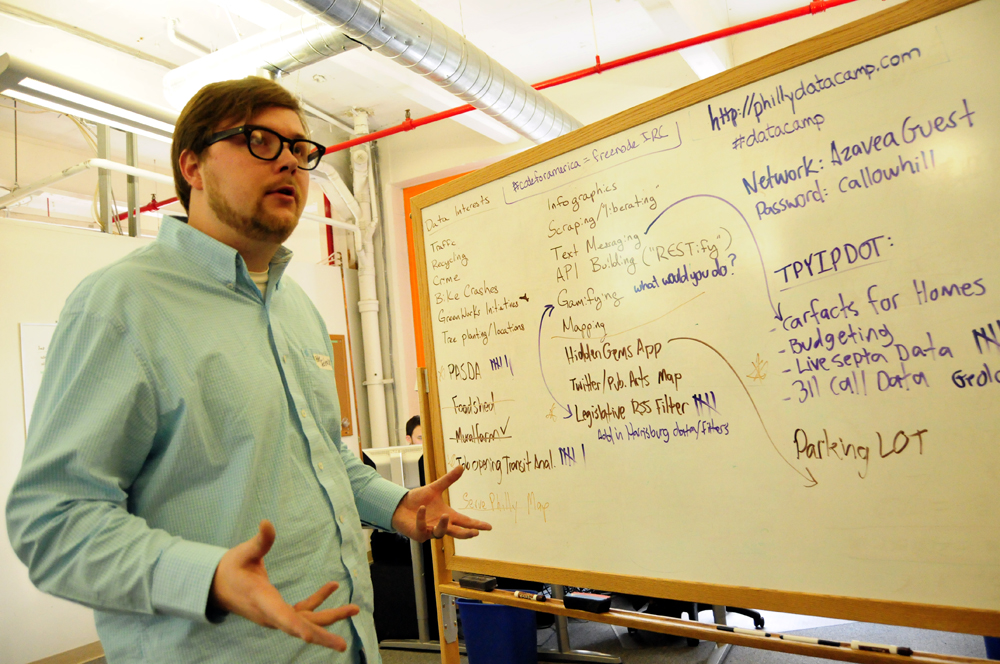If the seven Code for America Philadelphia fellows have their way, residents here will be soon follow City Council legislation in the form of a customizable e-mail, fitted with a subscription-based game with achievements and hopes for higher levels of participation at the core of its design.
That is just one of the projects that came from this past Friday’s Philly Data Camp, a one-day hackathon co-hosted by the seven CFA fellows and GIS shop Azavea. The event was something of a send off for the CFA pack, who are now back in San Francisco to begin planning and developing a project for the City of Philadelphia as part of their year of service.
Some 25 volunteers showed up to Azavea’s Callowhill offices to devote their Friday to the development of applications based around civic and geospatial data sets that can help Philadelphia citizens. And be created in a day’s time.
“We’ve got people from all walks,” said Pete Fecteau, 27, one of Code for America’s Philadelphia fellows and organizer of the event. “Developers, designers, researchers and people who don’t even know why they’re here. But they want to be here.”
Broken up into four teams, the volunteers were given the latter half of the day to brainstorm and develop demos of their directives. Despite the time limitations, the teams were able to develop four applications based on various civic data sets.
PHILLYAPI
Perhaps the most actionable of the projects was to create an API that sets loose Philadelphia-specific GIS data for developers, in a project led by CFA team lead Aaron Ogle and Voxeo open gov rep Mark Headd, who is organizing the April BCNI Open Gov Hackathon. To give a simple example of the PhillyAPI, the group created a basic application that allows a user to enter an address and get sent the locations of libraries up to one mile from their given location. To try the service, text your address, including “Philadelphia, PA” to 267-702-4999 or IM — via Jabber — phillylibrary@tropo.im. You’ll hear back.
Easily applicable to other data sets, such as locations of police stations and polling places, the program is meant to free up the city’s 311 service and help people who have cell phones but limited or no Internet access.
“A single call to 311 costs the city $3.30,” explained Fecteau. “We’re helping to free up money and agents in the city.”

CITY COUNCIL LEGISLATION DIGEST
The second group developed the as-yet not public City Council Legislation Digest, the aforementioned application that aims to add a gaming element to Philadelphia City Council legislation awareness. The service is designed to email subscribers with notifications about relevant bills and propositions moving through the city government and is targeted at concerned citizens and politicians. The team included Josh Marcus, the Azavea developer who debuted CommonSpace at last October’s Switch.
MAPPING JOBS
The third team came short of larger plans to show trends between job opportunities and transit access. Instead they created a static map of job openings in Southeastern Pennsylvania. Designed in the form of a heat map, creating quarterly iterations of the map could show trends in the market.
Scheduled for a reveal in mid-March, the fourth and final application is, in Fecteau’s words, “top secret,” and deals with city transportation data.
The ultimate goal of all this development is to provide Philadelphians with effective, innovative tools that contextualize formerly obscure city data in useful ways, Fecteau added.
Not bad for a day’s work.
Before you go...
Please consider supporting Technical.ly to keep our independent journalism strong. Unlike most business-focused media outlets, we don’t have a paywall. Instead, we count on your personal and organizational support.
Join our growing Slack community
Join 5,000 tech professionals and entrepreneurs in our community Slack today!

The person charged in the UnitedHealthcare CEO shooting had a ton of tech connections

The looming TikTok ban doesn’t strike financial fear into the hearts of creators — it’s community they’re worried about

Where are the country’s most vibrant tech and startup communities?


